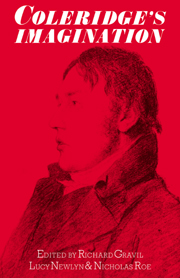Book contents
- Frontmatter
- Contents
- Pete Laver: a memoir
- Abbreviations
- Introduction
- Romantic imagination, nature and the pastoral ideal
- ‘The infinite I AM’: Coleridge and the Ascent of being
- Struggling with the contingent: self-conscious imagination in Coleridge's notebooks
- Coleridge's rejection of nature and the natural man
- The imagination of Mrs Samuel Taylor Coleridge: unknown inspiration of an unknown tongue
- ‘As much diversity as the heart that trembles’: Coleridge's notes on the lakeland fells
- ‘Leaping and lingering’: Coleridge's lyrical ballads
- ‘Radical Difference’: Coleridge and Wordsworth, 1802
- Imagining Wordsworth: 1797–1807–1817
- The Otway connection
- Imagining Robespierre
- Coleridge's Dejection: imagination, joy and the power of love
- Imagining naming shaping: stanza VI of Dejection: an Ode
- Mythopoesis: the unity of Christabel
- The languages of Kubla Khan
- Notes on the contributors
- Index
Imagining Robespierre
Published online by Cambridge University Press: 04 August 2010
- Frontmatter
- Contents
- Pete Laver: a memoir
- Abbreviations
- Introduction
- Romantic imagination, nature and the pastoral ideal
- ‘The infinite I AM’: Coleridge and the Ascent of being
- Struggling with the contingent: self-conscious imagination in Coleridge's notebooks
- Coleridge's rejection of nature and the natural man
- The imagination of Mrs Samuel Taylor Coleridge: unknown inspiration of an unknown tongue
- ‘As much diversity as the heart that trembles’: Coleridge's notes on the lakeland fells
- ‘Leaping and lingering’: Coleridge's lyrical ballads
- ‘Radical Difference’: Coleridge and Wordsworth, 1802
- Imagining Wordsworth: 1797–1807–1817
- The Otway connection
- Imagining Robespierre
- Coleridge's Dejection: imagination, joy and the power of love
- Imagining naming shaping: stanza VI of Dejection: an Ode
- Mythopoesis: the unity of Christabel
- The languages of Kubla Khan
- Notes on the contributors
- Index
Summary
O friend, few happier moments have been mine
Through my whole life than that when first I heard
That this foul tribe of Moloch was o'erthrown,
And their chief regent levelled with the dust.
(The Prelude, X, H.466–9)So Wordsworth tells Coleridge of his feelings when he heard of the death of Robespierre in summer 1794, while crossing the Leven Sands. ‘Great was my glee of spirit, great my joy’, he recalls. Coleridge's reaction to the news was different. He immediately collaborated with Sou they on a tragedy, The Fall of Robespierre, and he continued to explore Robespierre's character and motives in his political lectures of 1795. Coleridge's interest in Robespierre was shared by the leading reformist John Thelwall, and both agreed that the British prime minister Pitt lacked Robespierre's political skill. Coleridge went further, though, and used Robespierre as a foil in his developing idea of the imagination. When he wrote about Robespierre's death in The Prelude Wordsworth knew that Coleridge had not shared his feelings at the time, and that his friend's complex response to Robespierre was ultimately of the greatest importance to himself. Why then did Wordsworth insist so emphatically upon his exultant feelings,
‘Come now, ye golden times’,
Said I, forth-breaking on those open sands
A hymn of triumph,
(x, 11. 541–3)– recalling Robespierre's death as a moment of personal vindication?
The ‘golden times’ never came. France did not recover the revolutionary idealism of former years, and no longer provided a model for political and social change in Britain.
- Type
- Chapter
- Information
- Coleridge's ImaginationEssays in Memory of Pete Laver, pp. 161 - 178Publisher: Cambridge University PressPrint publication year: 1985



